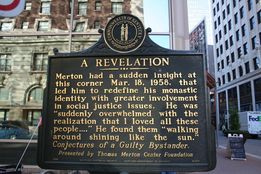
(For the audio version of this blog, please visit: http://brothersinchristcmf.org/wp-content/uploads/2022/05/Mass-Blog-for-Pentecost-Sunday-2022.mp3)
After their Master’s horrific death, Jesus’s disciples might have thought that a monastic lifestyle of isolated prayer was the way to go for inspiration. But a ministry built on fear is faithless, and as John’s gospel indicates this Pentecost Sunday (Jn 20:19-23), the disciples were like cornered prey, locked away and in hiding until …
Jesus came and stood in their midst and said to them, “Peace be with you.” When he had said this, he showed them his hands and his side. The disciples rejoiced when they saw the Lord. Jesus said to them again, “Peace be with you. As the Father has sent me, so I send you.”
The account of this meeting from Acts makes their sending even more dramatic, uniting these cornered souls in one spirit (Acts 2:1-11). And though they were suddenly seemingly able to speak diverse human tongues, they were actually fulfilling their mission to unify humanity by speaking one language. God’s peace is a strange tongue to humanity, however, and can be confusing to its hearers at first:
“Are not all these people who are speaking Galileans? Then how does each of us hear them in his native language? We are Parthians, Medes, and Elamites, inhabitants of Mesopotamia, Judea and Cappadocia, Pontus and Asia, Phrygia and Pamphylia, Egypt and the districts of Libya near Cyrene, as well as travelers from Rome, both Jews and converts to Judaism, Cretans and Arabs, yet we hear them speaking in our own tongues of the mighty acts of God.”
Paul’s gift of painting word pictures helps explain how God’s unifying language works in us (1 Cor 12:3b-7, 12-13):
As a body is one though it has many parts, and all the parts of the body, though many, are one body, so also Christ. For in one Spirit we were all baptized into one body, whether Jews or Greeks, slaves or free persons, and we were all given to drink of one Spirit.
But that was 2000 years ago, and fear still finds ways to corner each of us into isolation. It’s happened to the most spiritual of modern philosophers—even the great Thomas Merton. Father Merton found great inspiration and strength in the isolation of a monastery, but inspiration eventually transformed this Trappist monk into a writer, theologian, mystic, poet, and social activist. One experience of being spiritually cornered happened to him March 18, 1958, at the corner of Fourth and Walnut streets in downtown Louisville, KY. His personal Pentecost is memorialized by a sign erected at that intersection, quoting his testimony:
“I was suddenly overwhelmed with the realization that I loved all these people … walking around, shining like the sun.”
He expanded on his experience of being cornered in “Conjectures of a Guilty Bystander,” a book explaining how he escaped the occasional selfishness of his monastic lifestyle and connected with the human spirit.
“They were mine and I theirs, [and] we could not be alien to one another even though we were total strangers … I have the immense joy of being man, a member of a race in which God Himself became incarnate … If only we could see each other that way all the time. There would be no more war, no more hatred, no more cruelty, no more greed … But this cannot be seen, only believed …”
Merton’s friend, Chögyam Trungpa, a Tibetan Buddhist meditation master, taught that being cornered was a valuable experience. “Things get very clear when you are cornered but not held captive or imprisoned. … At this point, perhaps for the first time in the individual’s life, he begins to realize immense new possibilities.”
As Jesus’s disciples taught us while they were cowering in the corner of that upper room on Pentecost Sunday, a corner can become a Kingdom.
–Tom Andel